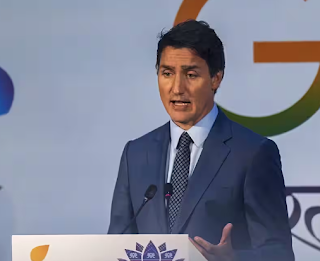Canadian Prime Minister Justin Trudeau found himself in an unexpected situation on Tuesday when, after being in India for the G20 Summit since September 8, he was finally able to depart for his homeland following a 36-hour delay caused by a technical issue with his plane.
The Canadian leader and his accompanying delegation had originally scheduled their departure from Delhi just two days after their arrival for the G20 Summit. However, an unfortunate glitch in his Airbus aircraft extended their stay in the Indian capital. According to the Press Secretary of Canada Prime Minister's Office (PMO), Mohammad Hussain, who was quoted by the news agency ANI, the technical problem that had plagued the aircraft was successfully resolved, and the clearance for takeoff was granted.
At the airport, Union Minister Rajeev Chandrasekhar was present to bid farewell to Trudeau, expressing gratitude for his participation in the G20 Summit. He conveyed appreciation on behalf of Prime Minister Narendra Modi and his government, conveying warm wishes for a safe journey back home in his message on an unspecified platform (referred to as "X" in the original content).
To add another layer of complexity to the situation, CBC News reported that the Canadian Air Force's CC-150 Polaris plane, which had been dispatched to pick up Trudeau, experienced an unexpected diversion to London, without any explanation provided for this unscheduled change in plans.
This technical setback occurred amid a backdrop of strained relations between India and Canada, primarily stemming from New Delhi's repeated concerns regarding Canada's reluctance to take action against individuals associated with Khalistani elements. India has consistently linked this reluctance to the Trudeau government's pursuit of "vote bank politics."
During their discussions on the sidelines of the G20 Summit, Prime Minister Narendra Modi conveyed his reservations to Trudeau regarding the ongoing activities of Khalistani elements within Canadian borders. The Prime Minister's Office released a statement articulating these concerns, highlighting that these elements were actively promoting secessionism, inciting violence against Indian diplomats, vandalizing diplomatic premises, and posing threats to the Indian community in Canada and their places of worship.
However, Trudeau maintained a non-committal stance when it came to addressing the Khalistani elements, asserting that Canada would steadfastly uphold the principles of freedom of expression, freedom of conscience, and the freedom to engage in peaceful protests.
Coincidentally, on the same day, an anti-India referendum took place at the Guru Nanak Singh Gurdwara in Surrey, Canada, where Gurpatwant Singh Pannun, a prominent figure associated with Khalistani separatist group Sikhs For Justice (SFJ), made an appearance.
In what was an unusually subdued visit to India for Trudeau, he notably opted to skip the G20 leaders' dinner on September 8, a decision that was not accompanied by an official explanation, as reported by Canada's CTV News.



